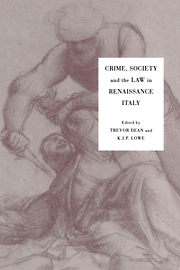Book contents
- Frontmatter
- Contents
- Illustrations
- List of contributors
- Preface
- 1 Writing the history of crime in the Italian Renaissance
- 2 Criminal justice in mid-fifteenth-century Bologna
- 3 The judicial system in Florence in the fourteenth and fifteenth centuries
- 4 The incidence of crime in Sicily in the mid fifteenth century: the evidence from composition records
- 5 Theology, nature and the law: sexual sin and sexual crime in Italy from the fourteenth to the seventeenth century
- 6 Practical problems in the enforcement of Italian sumptuary law, 1200–1500
- 7 The prince, the judges and the law: Cosimo I and sexual violence, 1558
- 8 Intervention by church and state in marriage disputes in sixteenth- and seventeenth-century Florence
- 9 The writer and the man. Real crimes and mitigating circumstances: il caso Cellini
- 10 The political crime of conspiracy in fifteenth- and sixteenth-century Rome
- 11 Fighting or flyting? Verbal duelling in mid-sixteenth-century Italy
- 12 Banditry and lawlessness on the Venetian Terraferma in the later Cinquecento
- 13 Mihi vindictam: aristocratic clans and rural communities in a feud in Friuli in the late fifteenth and early sixteenth centuries
- Index
11 - Fighting or flyting? Verbal duelling in mid-sixteenth-century Italy
Published online by Cambridge University Press: 14 October 2009
- Frontmatter
- Contents
- Illustrations
- List of contributors
- Preface
- 1 Writing the history of crime in the Italian Renaissance
- 2 Criminal justice in mid-fifteenth-century Bologna
- 3 The judicial system in Florence in the fourteenth and fifteenth centuries
- 4 The incidence of crime in Sicily in the mid fifteenth century: the evidence from composition records
- 5 Theology, nature and the law: sexual sin and sexual crime in Italy from the fourteenth to the seventeenth century
- 6 Practical problems in the enforcement of Italian sumptuary law, 1200–1500
- 7 The prince, the judges and the law: Cosimo I and sexual violence, 1558
- 8 Intervention by church and state in marriage disputes in sixteenth- and seventeenth-century Florence
- 9 The writer and the man. Real crimes and mitigating circumstances: il caso Cellini
- 10 The political crime of conspiracy in fifteenth- and sixteenth-century Rome
- 11 Fighting or flyting? Verbal duelling in mid-sixteenth-century Italy
- 12 Banditry and lawlessness on the Venetian Terraferma in the later Cinquecento
- 13 Mihi vindictam: aristocratic clans and rural communities in a feud in Friuli in the late fifteenth and early sixteenth centuries
- Index
Summary
A voluntary fight between two men, by which one intends to prove to the other with weapons, by his own prowess, secure from interference, in the space of one day, that he is a man worthy of honour, not to be despised or offended, while the other intends to prove the contrary.
By this famous mid sixteenth-century definition of the duel of honour, the case that follows was a non-event, a duel that never happened. Yet, in its own way it was a duel, fought between two men over a question of honour, according to a formal scenario. In place of swords and daggers they fought with words – thousands and thousands of words – over a period of many days. In sixteenth-century Italy verbal duelling seems to have been more common than the other kind, a fact noted but not well explained by contemporary observers and modern historians. So I will tell the story as a case history, giving a too-pale account of its florid and relentless exchanges, and make some tentative suggestions about the social significance of Italian verbal duelling.
To make sense of the story, readers need to be familiar with the typical scenario and terminology of the Renaissance duel. The classic paradigm goes like this.
- Type
- Chapter
- Information
- Crime, Society and the Law in Renaissance Italy , pp. 204 - 220Publisher: Cambridge University PressPrint publication year: 1994
- 3
- Cited by



